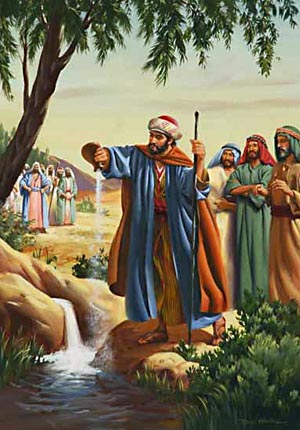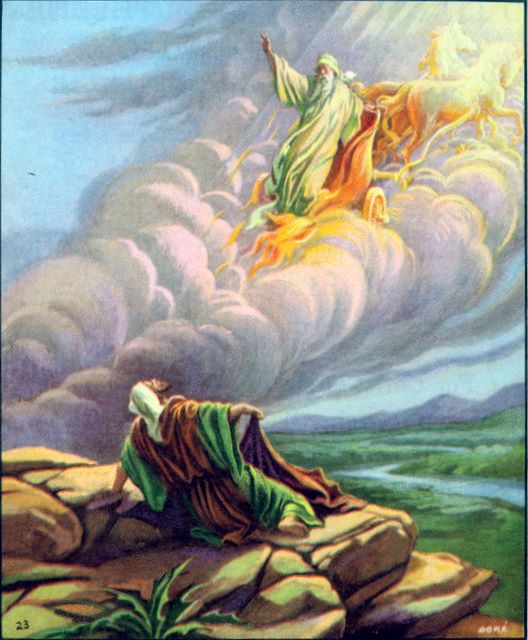
THE PROPHET ELISHA.
OF the many good men and prophets whom God sent to warn and instruct his ancient people, none has a more interesting history than the prophet Elisha. We first learn of him at his home, Abel-melolah, a little town situated in the valley of Jezreel, a few miles west of the River Jordan. Here he was plowing in the field with twelve yoke of oxen, when Elijah, who was at that time a great prophet in Israel, passed along, and casting his mantle upon Elisha, went on his way. Now the Lord had told Elijah of this man, and bade him call him to be prophet of Israel in his stead, for Elijah was then an old man.
Elisha seemed to understand what Elijah wanted, and after bidding his family farewell, he followed after him. For some years after this, he went. about with Elijah, both "ministering unto him"
and learning of him invaluable lessons and truths, calculated to fit him for the high place of trust which he was soon to fill.
At last Elijah's earthly work was done, but instead of his being called to meet death as other men do, the Lord saw fit to take him to himself alive. And on a certain day he and Elisha went up to Gilgal, a place between the Jordan and Jericho, where the Israelites first encamped in the Promised Land. The tabernacle was kept there for some time, and afterwards Saul was crowned king at the same place. It came to be an important town in Israel, and there was also a "school of the prophets" there, which would naturally make it an interesting place for Elijah and Elisha to visit. While here, Elijah told Elisha that he might tarry while he himself should go on to Bethel. Elisha, however, refused to do so, but said, "As the Lord liveth, and as thy soul liveth, I will not leave thee."
And when they had come to Bethel, Elijah urged Elisha to remain there, saying that the Lord had sent him to Jericho. But Elisha again refused to leave him, and so they went on to Jericho and finally to the Jordan. And Elijah took his mantle and smote the waters of the river, and they two passed over on dry land. And when they had gone over, Elijah made known to Elisha that he was to be taken away from him, and told him to ask what he should first do for him. And Elisha said, "I pray thee, let a double portion of thy spirit be upon me." And the prophet replied, "Thou halt asked a hard thing of me, nevertheless, if thou see me when I am taken from thee, it shall be so unto thee."
"And it came to pass as they still went on, and talked, that, behold, there appeared a chariot of fire and horses of fire, and parted them both asunder, and Elijah went up in a whirlwind into heaven." And Elisha saw it, and he cried, "My father, my father, the chariot of Israel and the horsemen thereof." And he took up the mantle of Elijah, which had fallen from him when he went up, and going back to the river Jordan, smote the waters, and they again opened for him to pass through. As he came to Jericho, the sons of the prophets came out to meet him and bowed themselves before him, saying, "The spirit of Elijah doth rest upon Elisha."
While at Jericho, the people of the place complained to him because the waters of the spring, which supplied their city were bitter, and made the land around barren. And he went out and cast salt into the spring, and said, " Thus saith the Lord, I have healed these waters, and there shall not be from thence any more death or barren land." And so it has proved. The city of Jericho has gone to ruin, but near the old site is a pure, gushing spring of water, which travelers speak of as peculiarly sweet and refreshing. And as if ever to keep in memory the miracle, it is called by the natives, "Elisha's Fountain." All around it the land is very fertile, and it is altogether a very pleasant place, being well shaded by palms, palms, fig trees, pomegranates, and other fruitful trees.
And as Elisha went on his way to Bethel, a town some distance northwest of Jericho, he must travel by a very rough and lonely road. But finally he came near to Bethel, and as he was going quietly along, probably thinking of the wonderful things he had just witnessed, a group of children came out of the town, and mocking him, began to cry, "Go up, thou bald head; go up, thou bald head." And Elisha looked back upon them and cursed them in the name of the Lord. And there came two bears out of the woods and tare forty-two of them. This seems a very hard fate for these thoughtless children to meet; but at this time many of the people of Israel were forsaking the God of their fathers, and worshiping idols and the strange gods of the heathen. This destruction of the children was doubtless meant to teach their parents and friends that there was a God in heaven, and that he, his works, and his servants, must be regarded with respect. It should also admonish children and young people of all times to treat the aged kindly and respectfully.
We have spoken of only a few of the interesting events in the life of this good prophet. During his long ministry he acted an important part in the public affairs of Israel; and many wonderful miracles were wrought at his word. They are mostly related in the first nine chapters of 2 Kings. He died lamented by king Joash and all the people.
